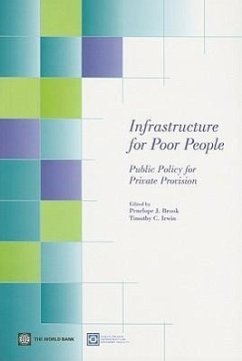During the last two decades many governments have allowed private companies to offer infrastructure services which were previously provided only by state-owned businesses. In some cases they have privatized state-owned business and in others, they have permitted private firms to invest in and operate those businesses under lease contracts or long-term concessions. In still other instances, private firms have been allowed to compete alongside former government monopolists.'Infrastructure for Poor People' examines the data on infrastructure and the poor in developing countries, and discusses how policies, centered on private provision, can address their needs. It focuses on the design of government policy for the provision of infrastructure services by private firms, highlighting the rules determining which firms can sell infrastructure services, the prices they can charge, the quality of service they must offer, and any subsidies provided by the government.








